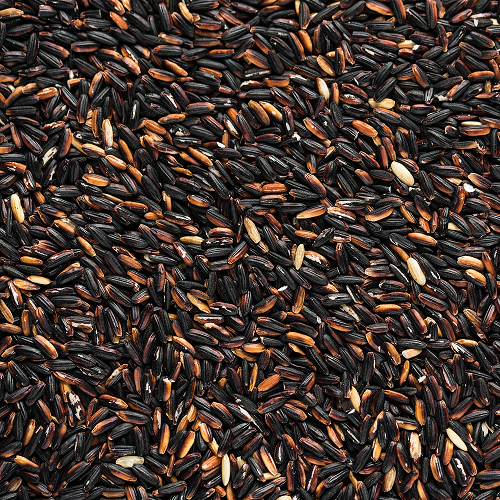
Black rice
Scientific names: Oryza sativa L
Family: Poaceae
Alternate names: Chak-Hao, Emperor's Rice, Forbidden Rice, Heaven Rice, Heuk-Mi, Imperial Rice, Prized Rice, Purple Black Rice
Actions: General, Antiaging, Antiallergy, Antiasthma, Anticancer, Antidiabetic, Antihyperlipidemic, Anti-inflammatory, Anti-obesity, Anti-osteoporosis, Antioxidant, Cardiovascular, Hepatic, Ocular
Background
Black rice is a type of rice (Oryza sativa L) native to East Asia. It contains high amounts of certain antioxidants called anthocyanins, which make it black.
There are over 200 different varieties of black rice. They've been consumed throughout East Asia for thousands of years. The high levels of antioxidants in black rice might help reduce swelling.
People use black rice for aging, hay fever, heart disease, obesity, physical performance in older adults, and many other purposes, but there is no good scientific evidence to support these uses.
Don't confuse black rice with rice bran, rice protein, brown rice, or red yeast rice. These are not the same.
There are over 200 different varieties of black rice. They've been consumed throughout East Asia for thousands of years. The high levels of antioxidants in black rice might help reduce swelling.
People use black rice for aging, hay fever, heart disease, obesity, physical performance in older adults, and many other purposes, but there is no good scientific evidence to support these uses.
Don't confuse black rice with rice bran, rice protein, brown rice, or red yeast rice. These are not the same.
Safety Safety definitions
When taken by mouth: Black rice is commonly consumed in foods. It is possibly safe when used in larger amounts as medicine. Black rice extract, as well as black rice germ and bran powder, have been used safely.
Special Precautions & Warnings:
Pregnancy and breast-feeding : Black rice is commonly consumed in foods. But there isn't enough reliable information to know if black rice is safe to use in larger amounts as medicine when pregnant or breast-feeding. Stay on the safe side and stick to food amounts.Effectiveness
Effective Effectiveness definitions
There is interest in using black rice for a number of purposes, but there isn't enough reliable information to say whether it might be helpful.
Dosing & administration
Black rice is commonly consumed in foods. As medicine, there isn't enough reliable information to know what an appropriate dose of black rice might be. Keep in mind that natural products are not always necessarily safe and dosages can be important. Be sure to follow relevant directions on product labels and consult a healthcare professional before using.
Interactions with pharmaceuticals
It is not known if Black Rice interacts with any medicines. Before taking Black Rice, talk with your healthcare professional if you take any medications.
Interactions with herbs & supplements
There are no known interactions with herbs and supplements.
Interactions with foods
There are no known interactions with foods.
vital.ly has licensed monographs from TRC Healthcare.
This monograph was last reviewed on 12/04/2024 10:00:00 and last updated on 27/10/2020 19:20:37. Monographs are reviewed and/or updated multiple times per month and at least once per year.
Natural Medicines disclaims any responsibility related to medical consequences of using any medical product. Effort is made to ensure that the information contained in this monograph is accurate at the time it was published. Consumers and medical professionals who consult this monograph are cautioned that any medical or product related decision is the sole responsibility of the consumer and/or the health care professional. A legal License Agreement sets limitations on downloading, storing, or printing content from this Database. No reproduction of this monograph or any content from this Database is permitted without written permission from the publisher. It is unlawful to download, store, or distribute content from this site.




